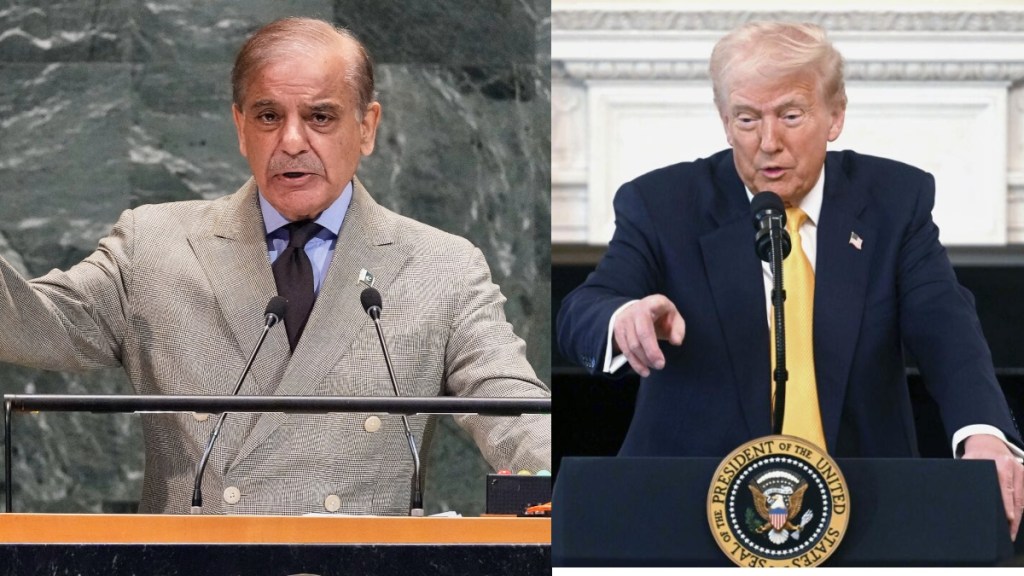Pakistan Prime Minister Shehbaz Sharif, in his address to the 80th UN General Assembly on Friday, spotlights US President Donald Trump’s role in halting a potential escalation with India, portraying him as a decisive mediator who prevented a full-scale war.
“Had Mr. Trump not intervened in a timely way and decisively, the consequences of a full-fledged war would have been catastrophic,” Sharif said, calling Trump’s leadership “bold and visionary.” He further described Trump as a “man of peace,” claiming Pakistan’s ceasefire agreement with India was facilitated by Trump’s intervention.
Sharif’s remarks came a day after he met Trump at the White House alongside Pakistani military chief Field Marshal Asim Munir, who reportedly told Trump he deserved a Nobel Peace Prize for helping achieve the ceasefire in Pakistan’s May conflict with India.
Claims of aerial victory
While focusing on Trump’s mediation, Sharif also recounted Pakistan’s military response during the crisis, claiming that its air force dealt a severe blow to India.
“Our falcons took flight and turned 7 Indian jets into scrap,” he said, praising Pakistan’s pilots.
Historically, Pakistan has claimed shooting down Indian aircraft in past conflicts, but India has consistently rejected these assertions as “baseless,” noting that Islamabad has yet to provide any evidence.
Operation Sindoor and the Pahalgam terror attack
Sharif framed India’s May offensive – Operation Sindoor – as an unprovoked act of aggression in response to the Pahalgam terror attack that killed 26 civilians.
“In May this year, my country confronted unprovoked aggression from the eastern front. Our response was in accordance with self-defence. We sent them back in humiliation,” he said.
Indian officials have maintained that Operation Sindoor was a calibrated counter-terror mission targeting nine locations in Pakistan and Pakistan-occupied Kashmir (PoK) and that civilian areas and military bases were deliberately avoided.
Indus Waters Treaty dispute
Sharif also accused India of violating the Indus Waters Treaty, framing it as part of a broader pattern of aggression.
“India’s unilateral and illegal attempt to hold the Indus Water Treaty in abeyance defies the provisions of the treaty itself as well as the norms of International law,” he said.
He further mentioned that, “Pakistan has made it abundantly clear that we will defend the inseparable right of our people on these waters. To us, any violation of the treaty represents an act of war.”
India suspended the treaty following the April 22 Pahalgam terror attack as a countermeasure, arguing that the move was fully within international law and linking its revival to Pakistan taking concrete steps to stop cross-border terrorism.
Kashmir and the call for dialogue
Sharif reiterated Pakistan’s longstanding stance on Kashmir while simultaneously signaling readiness for talks. “I wish to assure Kashmiri people that I stand with them, Pakistan stands with them, and one day soon India’s tyranny in Kashmir will come to a halt,” he said.
He also noted Pakistan’s willingness for a broad, result-oriented dialogue with India. “Pakistan stands ready for a composite, comprehensive and result-orientated dialogue with India on all outstanding issues,” Sharif said.
However, India has consistently rejected dialogue unless Pakistan takes credible action against terror groups operating from its soil.
Pakistan’s role in fighting terrorism
Sharif underscored the costs Pakistan has borne in the fight against terrorism, both socially and economically. “Pakistan’s sacrifices are probably the biggest around the globe,” he said, claiming that terrorism had cost his country $150 billion.
By placing Trump’s mediation at the centre, Sharif presented Pakistan as a nation under threat that had avoided a larger conflict thanks to timely US intervention, while highlighting India’s actions as aggressive and unilateral.
India hits back at Sharif, terms claims ‘absurd theatrics’
After Sharif’s “absurd theatrics” at the UNGA, India responded sharply, stating that “no drama or lies can conceal the facts.” Exercising India’s right of reply at the UNGA, Patel Gehlot, First Secretary in India’s Permanent Mission to the UN, said, “This Assembly witnessed absurd theatrics in the morning from the Prime Minister of Pakistan, who once again glorified terrorism that is so central to their foreign policy. However, no degree of drama and no level of lies can conceal the facts.”
“The pictures of that damage are, of course, publicly accessible. If destroyed runways and burnt-out hangars look like victory, as the Prime Minister claimed, Pakistan is welcome to enjoy it,” she added.
“Its ministers have just recently acknowledged that they have been operating terrorist camps for decades. It should come as no surprise that once again this duplicity continues, this time at the level of its Prime Minister,” Gehlot further said.

